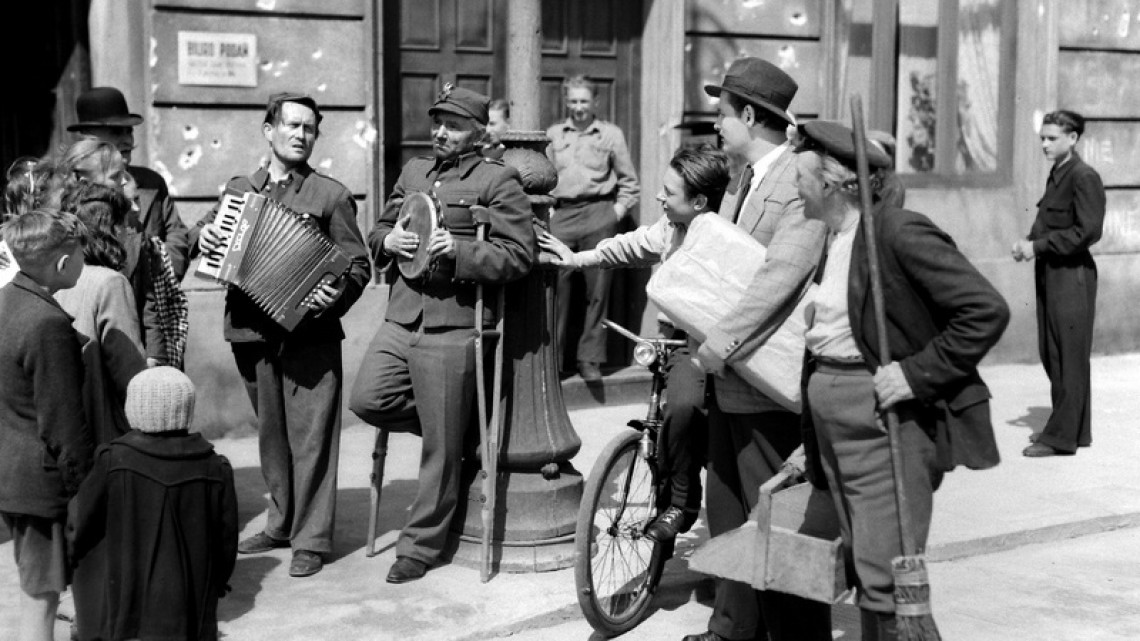
The film “Forbidden Songs,” depicting music and life in Warsaw during the German occupation of Poland in World War II, screens March 17 in the Klarman Hall auditorium.
Things to Do, March 16-23, 2018
By Daniel Aloi
Maple Fest
Cayuga Nature Center hosts Maple Fest 2018, March 17 from 9 a.m. to 2 p.m., with a pancake breakfast, music, vendors and educational activities for all ages.
Breakfast includes pancakes with maple syrup, apple crisp, sausage, coffee and orange juice, served until 1 p.m.
Activities include a sugaring demonstration at the nature center’s sugar shack; a “Maple and Climate” talk at noon by Brian Chabot, professor emeritus of ecology and evolutionary biology; and live animal programs at 11 a.m. and 1 p.m. Live music is by Technicolor Trailer Park, Tyler Hubbard & Friends, and D-n-T.
The cost is $12 for adults, $7 for children; free for ages 3 and under, and $35 for a family up to five people. Nature center members pay $10 (adults), $5 (children) and $25 (family). Young Naturalist Access Program members are admitted free.
All proceeds benefit Cayuga Nature Center’s mission and educational programming.
Thrillers and winners
Cornell Cinema is screening the local premiere of “In the Fade,” German director Fatih Akin’s thriller about the aftermath of a bombing, March 22, 24 and 25 in Willard Straight Theatre. The film won this year’s Golden Globe for Best Foreign Language Film and actress Diane Kruger received a Best Actress award at the 2017 Cannes Film Festival.
Also showing: The 2017 film biography of Tonya Harding, “I, Tonya,” and Guillermo del Toro’s multiple Oscar-winning 2017 fantasy drama, “The Shape of Water” (both screening March 16, 17 and 18).
“Forbidden Songs”
The Department of Music will present “Forbidden Songs,” celebrating the long-lost music of Polish composer Roman Palester (1907-1989), March 17-18. The event features American premieres of his chamber music and vocal works performed by Ensemble X, and a film Palester scored with music banned by the Nazis. Events are free and open to the public.
The 1947 film “Forbidden Songs” depicts everyday life in Warsaw immediately after WWII. Palester scored the film by arranging and reworking music banned during the German occupation, including satirical “street songs” of resistance.
The world premiere of the English-subtitled version of the film is March 17 at 8 p.m. in Rhodes-Rawlings Auditorium, Klarman Hall, with remarks by Swarthmore College associate professor of music Barbara Milewski.
Members of Ensemble X – including pianist Xak Bjerken, soprano Lucy Fitz Gibbon and violinists David Colwell and Susan Waterbury – will perform a concert of Palester’s music, March 18 at 3 p.m. in Barnes Hall Auditorium.
“It’s very attractive music – it’s playful yet soulful,” says Waterbury, professor of violin at Ithaca College.
“Palester had to overcome two authoritarian regimes: first, the brutal and terrorizing Nazi occupation and then the repressive communist government that rebuilt Poland from the rubble up,” says Mackenzie Pierce, a Cornell doctoral student in musicology, who will give a pre-concert lecture exploring Palester’s life and music at 2:30 p.m.
Education and inequality
Noliwe Rooks, the author of “Cutting School: Privatization, Segregation and the End of Public Education,” discusses the state of public education in the United States and provides an analysis of our separate and unequal schools in a Chats in the Stacks book talk, March 20 at 4:30 p.m. in 107 Olin Library. The talk is free and open to the public and sponsored by Olin Library, with refreshments served.
America’s public schools are among modern history’s greatest achievements, yet have seen intractable tensions tied to race and poverty from the earliest days of tax-supported education. Rooks will explain why profiting from the failure to provide a high-quality education to all children has become a very big business, and address such controversial topics as school choice, teacher quality and the school-to-prison pipeline.
Rooks is associate professor of Africana studies and Feminist, Gender and Sexuality Studies and director of the American Studies Program at Cornell. Her research breaks down “segrenomics,” showing how experimental solutions to achievement gaps – including charters, vouchers and cyber schools – rely on, profit from and exacerbate racial and economic segregation under the guise of providing equal opportunity.
Creative survival
Award-winning activist, artist and teacher Rhodessa Jones will share “creative survival” techniques during a campus visit, including a public lecture at the Schwartz Center for the Performing Arts.
Jones will discuss theatrical methods for social transformation and working with marginalized communities in “Creative Survival: Art and Activism for the 21st Century,” March 20 at 4:30 p.m. in the Film Forum.
A workshop master class, March 22, 4:30-6 p.m. in 322 Schwartz, will offer similar social justice and storytelling theater techniques for interested students. Registration is required and space is limited; email associate professor of performing and media arts Sara Warner for more information.
Making her first visit as a Frank H.T. Rhodes Class of 1956 Visiting Professor, Jones also leads workshops at Ujamaa Residential College and Hans Bethe House, and will work with the Phoenix Players Theatre Group at Auburn Correctional Facility with the Cornell Prison Education Program.
Creative survival is about people saving their own lives through art, and using theater to help them imagine and realize a different future for themselves. Jones developed the concept as director of The Medea Project: Theater for Incarcerated Women, working with imprisoned and HIV-positive women to create original dramatic works about their experiences.
Media Contact
Get Cornell news delivered right to your inbox.
Subscribe
